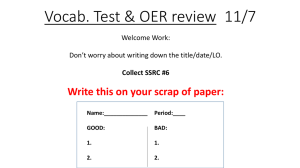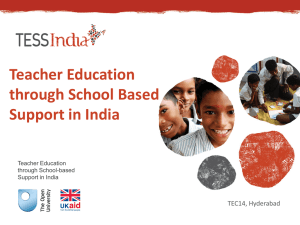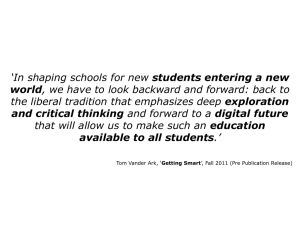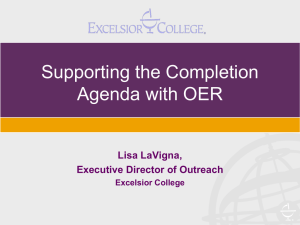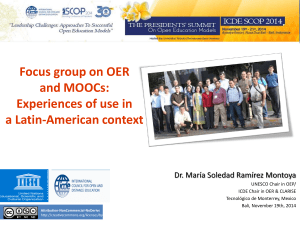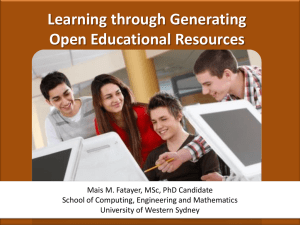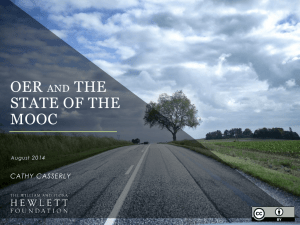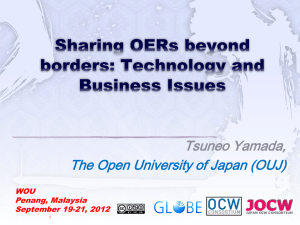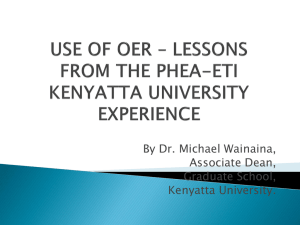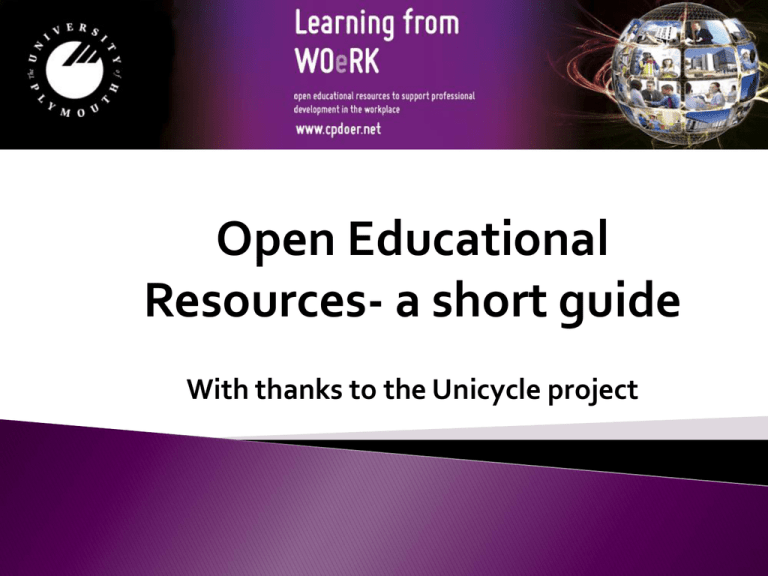
Open Educational
Resources- a short guide
With thanks to the Unicycle project
What are they?
“OER are teaching, learning and research resources
that reside in the public domain or have been released
under an intellectual property licence that permits
their free use or re-purposing by others. Open
educational resources include full courses, course
materials, modules, textbooks, streaming videos,
tests, software, and any other tools, materials or
techniques used to support access to knowledge”.
William and Flora Hewlett Foundation, supporter of the worldwide Open
Educational Resources (OER) movement
Some key points
1. OER are free to use and publicly available.
2. OER can be used in teaching and learning (usually
with attribution to the creator).
3. The majority of OER can be altered and adapted
(‘repurposed’.)
4. Using OER is not cheating; it can improve learning
experiences by building on other people’s work.
5. OER development is a global movement – don’t be
afraid to search global OER repositories.
6. OER materials are not just teaching materials; there
are a number of student support materials
Some points for academics
1. Spend more time designing learning rather than
creating content. (You really don’t have to recreate
the wheel).
2. Get recognition for your own materials development
by sharing them as OER.
3. Engage in a global community of sharing and using
educational resources.
4. Collaborate with colleagues to release OER
materials.
5. Set yourself an OER development target and
implement it as a SMART objective.
Some points for academics
6. Spend more time working to your strengths and search for
free materials where your own content may be weaker.
7. Encourage your students to search for OER materials to
support their own learning. (You never know, they might
find something you can use next year!)
8. Embed the use of OER as part of your module/course
review process.
9. Be proud of your work and share it with others as OER.
10.Get recognition for your work, being attributed by others
through OER release.
How can OER benefit the
student experience?
1.Engage a wider range of learners by accessing
a wider range of student support resources.
2.Spend more time improving the learning experience
rather than content creation.
3.Provide access to resources that you wouldn’t be able to
offer without OER (e.g. photos or videos of locations
and situations you can’t create/access).
4.Encourage students to access and share OER as part of
their development.
5. Offer a range of learning materials to students for the
same content (encompassing more learning styles).
How can OER benefit the
student experience?
6. Use OER as a way of building a range of student
support resources.
7. Develop case study OER with students and
release them.
8. Improve student feedback and assessment by
using available OER materials.
9. Enable prospective students to see more detail
of your course before they register.
10.Enable students to review material and refresh
their knowledge and understanding after they
have completed their course.
Intellectual Property Rights
(IPR) – some key points
1. Ensure that any media or content you use does not have
any third party copyright or IPR restrictions (or that
permission has been granted and recorded)
2. By default Google searches for images which are
copyright and is therefore not the best source for OER
3. www.creativecommons.org has a search tool for a range
of media content
4. Creative Commons is not about giving up rights to your
work, but making it available under certain conditions.
Intellectual Property Rights
(IPR) – some key points
5. OER materials released through our project will be
assigned the CC-BY-NC-SA licence – where material is
reused, you will be attributed as the original author
and your material may not be used commercially.
6. Fair dealing is a copyright term that allows limited use
of material without requiring permission from the
rights holders. This may apply to some teaching
situations but NOT for the development of OER.
7. Creative Commons licences are enforceable by UK law.
8. More detailed information is available from the OER
IPR Support Project’s: OER IPR starter pack
This resource was created by the University of Plymouth, Learning from WOeRK project. The project
is funded by HEFCE as part of the HEA/JISC OER release programme.
This resource is licensed under the terms of the Attribution-Non-Commercial-Share Alike 2.0 UK:
England & Wales license (http://creativecommons.org/licenses/by-nc-sa/2.0/uk/).
The resource, where specified below, contains other 3rd party materials under their own licenses. The
licenses and attributions are outlined below:
1. These
contents are based on , A staff guide to Open Educational Resources, developed by the Unicycle project, based at
Leeds Metropolitan University
•The name of
the University of Plymouth and its logos are unregistered trade marks of the University.
The University reserves all rights to these items beyond their inclusion in these CC resources.
•The JISC
logo, the and the logo of the Higher Education Academy are licensed under the terms of
the Creative Commons Attribution -non-commercial-No Derivative Works 2.0 UK England & Wales
license. All reproductions must comply with the terms of that license.
Author
Pete Watton
Institution
University of Plymouth
Title
OER benefits
Description
Presentation
Date Created
6/12/10
Educational Level
Keywords
IPR, OER, Intellectual Property Rights
Creative Commons License
BY NC SA
©University of Plymouth, 2010, some rights reserved

